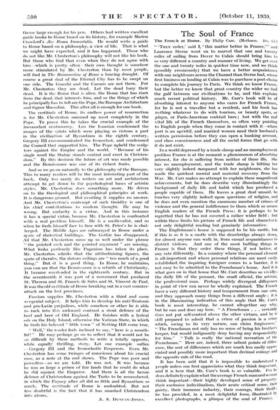The Soul of France
The French at Home. By Philip Carr. (Methuen. las. c,d.)
'THEY order,' said I, 'this' matter better in France," and Laurence Sterne went on to marvel that one and twenty miles of sailing from Dover to Calais should bring him to so very different a country and manner of living. We get over the one and twenty miles in quicker time now, and we think (possibly erroneously) that we have a better acquaintance with our neighbours across the Channel than Sterne had, whose first business on landing at Calais was to purchase a post-chaise to complete his journey to Paris. We think we know France, but the better we know that great country the wider we find the gulf between our civilizations to be, and this explains much recent political history. Mr. Carr's book will be of absorbing interest to anyone who cares for French France, for he is not a traveller but a resident, and his book has nothing whatever to do with tourism, or beauty spots, or pktges, or Paris-American cocktail bars ; but with the real vital life of the French themselves, so often very puzzling to English people when they come in contact with it—where port is an aperitif, and married women need their husband's written permission before they can open a banking account, and class consciousness and all the social forms that go with it do not exist.
In a world depressed by a trade slump and an unemployment problem France is at the moment a phenomenon of absorbing interest, for she is suffering from neither of these ills. She has no unemployment, and the trade slump is hitting her very slightly indeed compared with her neighbours, she has made the quickest mental and material recovery from the War. Mr. Carr makes no attempt to explain these magnificent achievements, but he does describe very illuminatingly the background of daily life and habit which has produced a people capable of them. He leaves a great deal unsaid, he touches very slightly indeed upon questions of religion, and he does not even mention the enormous number of crimes of violence and the general indifference to them which so amaze English readers of the French Press; it is perhaps to be regretted that he has not covered a rather wider field : but within these limits his picture of French life and character is not only delightful reading but genuinely informative.
The Englishman's house is supposed to be his castle, but if this is so it is a castle with the drawbridge always down, for almost anyone can walk in, from casual acquaintances to district visitors. And one of the most baffling things in France is that they order these things, if not better, at any rate differently. In a country where the personal element is all-important and where personal relations are most easily established, the inquiring foreigner comes to a barrier, it is not easy to be admitted to the Frenchman's home. And it is what goes on in that home that Mr. Carr describes so vividly: the daily life of the peasant, the small official, the artisan, the professional man. Perhaps widely divergent differences in point of view can never be wholly explained. The French have a very different history and temperament from our own, and they approach many things from a different angle ; it is in the illuminating indication of this angle that Mr. Carr's book is most interesting, he cannot altogether say why, but he can and does say how. "A Frenchman . . . certain does not put self-control above the other virtues, and be is still prepared to admit that a crime of passion is a crime, which, owing to its very nature, can claim forgiveness.' "The Frenchman not only has no sense of being his brother's keeper, but would indignantly deny having any responsibility for him." "Talk is really the national recreation of the Frenchman." Here are, indeed, three salient points of differ- ence, the sort of differences which are much less easily appre- ciated and possibly more important than decimal coinage and the opposite rule of the road.
It has been said that it is impossible to understand people unless one first appreciates what they think important and it is here that Mr. Care's book is so valuable. For he does definitelyexplain what theaverage French man and WT11110 think important—their highly developed sense of property, their exclusive individualism, their acute critical sense, their gaiety, their immense industry, their courage, their thrift: he has provided, in a most delightful form, illustrated by excelleut photographs, a- glimpse of the soul of - France.








































 Previous page
Previous page